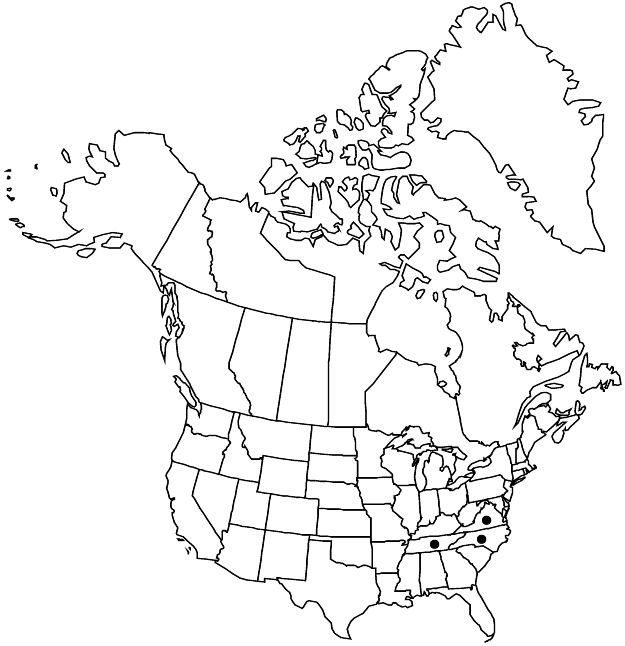Difference between revisions of "Hypericum ×mitchellianum"
Torreya 27: 84, plate 2, figs. 1 – 6. 1927.
FNA>Volume Importer |
imported>Volume Importer |
||
| (6 intermediate revisions by 2 users not shown) | |||
| Line 28: | Line 28: | ||
|elevation=1100–1700 m | |elevation=1100–1700 m | ||
|distribution=N.C.;Tenn.;Va. | |distribution=N.C.;Tenn.;Va. | ||
| − | |discussion=<p>Hypericum ×mitchellianum is intermediate in all characters between H. graveolens and H. punctatum and, like the latter, produces a ring of 16 chromosomes at meiosis (D. E. Culwell 1970). Culwell has shown that it hybridizes with H. graveolens in the field and that these species can be crossed artificially. He apparently never suspected that H. mitchellianum could itself be a hybrid. Its intermediate morphology and breeding behavior, together with a distribution almost wholly within that of H. graveolens, suggests strongly that H. mitchellianum is the hybrid H. graveolens × punctatum, which apparently arose when the area of H. punctatum extended into that of H. graveolens.</p> | + | |discussion=<p><i>Hypericum ×mitchellianum</i> is intermediate in all characters between <i>H. graveolens</i> and <i>H. punctatum</i> and, like the latter, produces a ring of 16 chromosomes at meiosis (D. E. Culwell 1970). Culwell has shown that it hybridizes with <i>H. graveolens</i> in the field and that these species can be crossed artificially. He apparently never suspected that H. mitchellianum could itself be a hybrid. Its intermediate morphology and breeding behavior, together with a distribution almost wholly within that of <i>H. graveolens</i>, suggests strongly that H. mitchellianum is the hybrid <i>H. graveolens</i> × punctatum, which apparently arose when the area of <i>H. punctatum</i> extended into that of <i>H. graveolens</i>.</p> |
|tables= | |tables= | ||
|references= | |references= | ||
| Line 37: | Line 37: | ||
-->{{#Taxon: | -->{{#Taxon: | ||
name=Hypericum ×mitchellianum | name=Hypericum ×mitchellianum | ||
| − | |||
|authority=Rydberg | |authority=Rydberg | ||
|rank=species | |rank=species | ||
| Line 52: | Line 51: | ||
|publication year=1927 | |publication year=1927 | ||
|special status=Endemic | |special status=Endemic | ||
| − | |source xml=https:// | + | |source xml=https://bitbucket.org/aafc-mbb/fna-data-curation/src/2e0870ddd59836b60bcf96646a41e87ea5a5943a/coarse_grained_fna_xml/V6/V6_178.xml |
|genus=Hypericum | |genus=Hypericum | ||
|section=Hypericum sect. Hypericum | |section=Hypericum sect. Hypericum | ||
Latest revision as of 22:19, 5 November 2020
Herbs erect, with rooting, creeping base, 2–6.5 dm. Stems: internodes usually 2-lined, sometimes 4-lined or not lined, with black glands scattered on and near lines or all over. Leaves spreading, usually sessile, rarely petiolate (to 0.8 mm); blade ovate-oblong to oblong or elliptic, 30–42(–52) × 8–22 mm, base subcordate to rounded, margins plane, apex usually rounded, rarely obtuse or subretuse, midrib with 4–5 pairs of branches, tertiary veins densely reticulate toward margins, black glands intramarginal (dense) and laminar (scattered). Inflorescences corymbiform to broadly pyramidal, (5–)13–61(–124)-flowered, subsidiary branches narrowly ascending or curved-ascending. Flowers 15–20 mm diam.; sepals not imbricate, erect in fruit, lanceolate to ovate-elliptic or elliptic, subequal, (3–)3.6–4.6(–5.5) × 1–2 mm, apex acute to obtuse; petals golden yellow, narrowly obovate or oblanceolate to elliptic, 6–11 mm; stamens (37–)42–56(–62); anther gland black; styles 1.5–5 mm. Capsules ellipsoid to subglobose, 3–7 × 3–4.5 mm, with longitudinal vittae. Seeds not carinate, 0.7–0.9 mm; testa not seen. 2n = 16.
Phenology: Flowering summer (Jun–Aug).
Habitat: Open or partly shaded, moist habitats, dry, rocky roadside banks
Elevation: 1100–1700 m
Distribution

N.C., Tenn., Va.
Discussion
Hypericum ×mitchellianum is intermediate in all characters between H. graveolens and H. punctatum and, like the latter, produces a ring of 16 chromosomes at meiosis (D. E. Culwell 1970). Culwell has shown that it hybridizes with H. graveolens in the field and that these species can be crossed artificially. He apparently never suspected that H. mitchellianum could itself be a hybrid. Its intermediate morphology and breeding behavior, together with a distribution almost wholly within that of H. graveolens, suggests strongly that H. mitchellianum is the hybrid H. graveolens × punctatum, which apparently arose when the area of H. punctatum extended into that of H. graveolens.
Selected References
None.